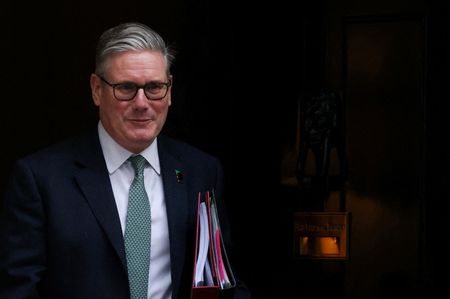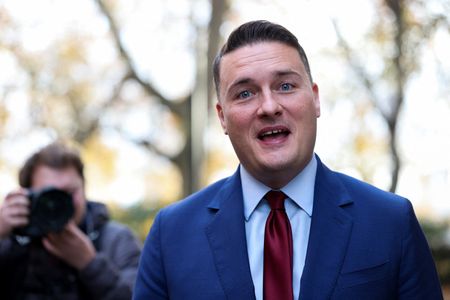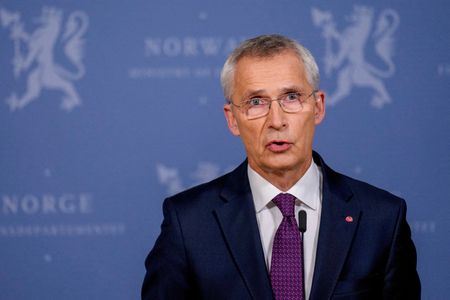By Sam Tabahriti and Elizabeth Piper
LONDON (Reuters) -British Prime Minister Keir Starmer distanced himself on Wednesday from a briefing by unnamed allies that he would fight any leadership bid, throwing his support behind his health minister Wes Streeting who had been named as a challenger.
After the briefing to selected media outlets late on Tuesday raised questions about the prime minister’s authority, Starmer, whose poll ratings have sunk since an election win in July 2024, took to parliament to try to set the record straight, saying he “never authorised attacks” on his ministers.
He was referring to a briefing by “his allies” in which they said the prime minister would fight any challenge to his leadership, with Streeting and interior minister Shabana Mahmood named as possible candidates to replace him.
STARMER SAYS ANY ATTACK ON MINISTERS IS ‘UNACCEPTABLE’
“Any attack on any member of my cabinet is completely unacceptable,” he told parliament during the weekly prime minister’s questions session.
“I’ve never authorised attacks on cabinet members. I appointed them to their posts because they’re the best people to carry out their jobs … This is a united team and we are delivering together,” he said.
He also defended his chief adviser, Morgan McSweeney, who the leader of the opposition Conservatives, Kemi Badenoch, named when describing Starmer’s Downing Street operation as “toxic”.
His political spokesperson described the briefing and resulting reports as “frustrating distractions from the work that the government is doing”.
Earlier, Streeting was forced to deny that he was plotting to bring down Starmer after the budget on November 26 when the government is expected to break one of its main election pledges to increase income taxes for the first time since the 1970s.
“That briefing is categorically untrue,” Streeting told BBC Radio.
Doing the early media round of talking to broadcasters, Streeting said the briefings of a challenge were self defeating because they gave the impression Starmer was fighting for his job when he was instead focused on fighting to improve Britain.
“I’m not going to demand the prime minister’s resignation,” he told Sky News. “I support the prime minister. I have done since he was elected leader of the Labour Party.”
British government bond prices fell early on Wednesday and underperformed against U.S. and German bonds, possibly hinting at investor unease over Starmer’s prospects. The pound fell by around a third of a cent against the U.S. dollar.
Market strategists said investors were concerned that if Starmer was no longer prime minister it could potentially lead to a left-leaning candidate taking over and raising government borrowing.
CHALLENGE FROM NIGEL FARAGE’S PARTY
Much of Labour’s unpopularity has stemmed from tax rises and failed attempts at cutting welfare spending, showing the potential for the budget to be the next flashpoint.
Two Labour lawmakers expressed exasperation at the briefing, saying it underlined what they said was a poorly functioning team around Starmer in Downing Street. One said on condition of anonymity that it felt “very end of days”.
Opinion polls suggest Starmer is one of the most unpopular prime ministers of all time, and his party has trailed Nigel Farage’s populist Reform UK party for months.
But it is particularly difficult to oust a Labour leader because any challenge would need the backing of 20% of the party’s lawmakers in parliament, which roughly means around 80 of them agreeing on an alternative candidate.
The centre-left Labour Party is now bracing for the budget on November 26, with finance minister Rachel Reeves suggesting she will have to increase taxes to fill a fiscal black hole, a year after she hiked levies by 40 billion pounds ($53.7 billion) in what she said was a one-off event.
($1 = 0.7451 pounds)
(Reporting by Sam Tabahriti and by Elizabeth Piper; additional reporting by Alistair Smout, Editing by Alison Williams)














